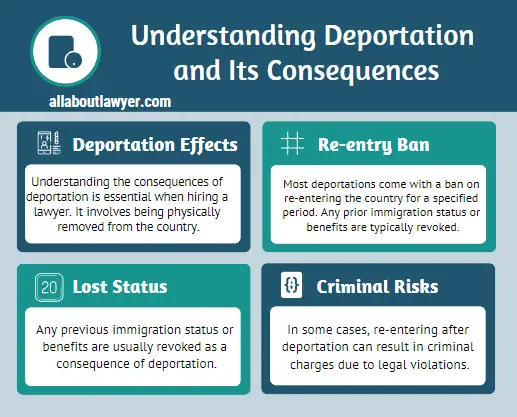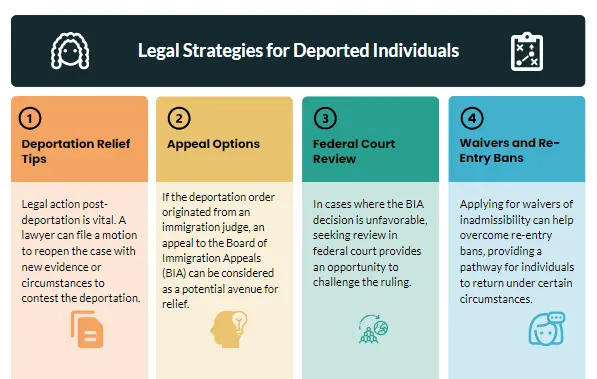Can I Hire a Defense Lawyer If I Am Deported? Guide By All About Lawyer
magine being torn away from the life you’ve built, your job, your home, and your community, forced to leave a country you’ve called home for years. The anxiety is overwhelming, and for the hundreds of thousands of people who face deportation each year in the United States, this is a harsh reality. In fact, in 2022 alone, U.S. Immigration and Customs Enforcement (ICE) reported over 72,000 deportations, leaving many wondering what legal options remain once they’ve been removed from the country.
One of the most urgent questions in this situation is whether you can still hire a defense lawyer after deportation. The short answer is yes, but navigating the legal landscape post-removal can be challenging. In this article, we’ll explore the options available for legal representation after deportation, why having a lawyer is crucial, and the potential strategies that can still be pursued even after you’ve been removed from the country. Understanding your rights and opportunities in this complex legal environment could make all the difference for you or your loved ones.
Table of Contents
Understanding Deportation and Its Consequences
Before delving into the specifics of hiring a lawyer after deportation, it’s crucial to understand what deportation entails and its immediate consequences:
1. Removal from the Country:
Deportation results in the individual being physically removed from the country.
2. Re-entry Ban:
Most deportations come with a ban on re-entering the country for a specified period.
3. Loss of Immigration Status:
Any prior immigration status or benefits are typically revoked.
4. Potential Criminal Consequences:
In some cases, re-entering after deportation can result in criminal charges.
Given these serious consequences, the question of whether one can retain a lawyer after expulsion becomes even more critical.

The Right to Legal Representation Post-Deportation
The good news is that even after being deported, individuals retain the right to secure advocate following deportation. While the process may be more challenging, it is not only possible but often advisable to obtain legal representation post-exile. Here’s why:
1. Challenging the Deportation Order: In some cases, it may be possible to challenge the validity of the deportation order itself.
2. Exploring Relief Options: A lawyer can help identify and pursue potential relief strategies that may allow for re-entry.
3. Handling Complex Legal Procedures: Immigration law is notoriously complex, and having expert guidance is invaluable.
4. Protecting Your Rights: Even when outside the country, you have certain rights that a lawyer can help protect.
How to Engage Legal Counsel Post-Removal
While the process of hiring a lawyer after being deported can be more complicated, there are several ways to go about it:
1. Remote Consultations: Many immigration attorneys offer remote consultations via phone or video call.
2. Family or Friends Assistance: Relatives or friends in the country of deportation can help in securing legal representation on your behalf.
3. Legal Aid Organizations: Some non-profit organizations specialize in assisting deported individuals and can help connect you with legal resources.
4. Embassy or Consulate Referrals: In some cases, your home country’s embassy or consulate in the country you were deported from may provide referrals to legal services.
The Role of a Lawyer in Post-Deportation Cases
When you acquire counsel after forced departure, your attorney can assist in several crucial areas:
1. Case Evaluation:
Thoroughly reviewing the circumstances of your deportation to identify any potential legal issues or grounds for appeal.
2. Developing Legal Strategies:
Crafting appropriate legal approaches based on your specific situation and goals.
3. Filing Appeals or Motions:
Preparing and submitting necessary legal documents to challenge the deportation or seek re-entry.
4. Representation in Absentia:
Representing your interests in immigration court or before relevant agencies, even in your absence.
5. Advising on Re-entry Options:
Providing guidance on potential paths for lawful re-entry, including waiver applications.
Legal Strategies for Deported Individuals
Depending on the specifics of your case, a lawyer may pursue various post-deportation relief strategies:
1. Motion to Reopen:
Challenging the deportation order based on new evidence or changed circumstances.
2. Appeal to the Board of Immigration Appeals (BIA):
If the deportation order was issued by an immigration judge.
3. Federal Court Review: Seeking review of the BIA decision in federal court.
4. Waivers: Applying for waivers of inadmissibility to overcome re-entry bans.
5. Asylum or Withholding of Removal: In cases where return to the home country poses a threat to safety.
6. Adjustment of Status: For those who may have become eligible for a green card through family relationships or other means.

Challenges in Post-Deportation Legal Representation
While it is possible to enlist attorney services post-banishment, there are unique challenges to be aware of:
1. Communication Difficulties: Coordinating with a lawyer across international borders can be complicated.
2. Document Gathering: Obtaining necessary documents from abroad may be more challenging.
3. Limited Physical Presence: The inability to be physically present for certain proceedings can be a hurdle.
4. Time Constraints: Some legal remedies have strict time limits that may be harder to meet from abroad.
The Importance of Timely Action
Even if you’ve been deported, it’s crucial to seek legal assistance as soon as possible. Many legal remedies have strict deadlines, and delay can result in lost opportunities. A lawyer can help you understand these time constraints and act promptly to protect your rights.
Costs and Considerations
Hiring a lawyer while outside the country can present financial challenges. However, many attorneys offer flexible payment options or reduced fees for certain cases. It’s important to discuss fees upfront and explore all options, including:
1. Pro bono services
2. Payment plans
3. Limited scope representation
The Role of Technology in Post-Deportation Legal Representation
Advancements in technology have made it easier to obtain advocate services post-deportation. Many lawyers now utilize:
1. Video conferencing for consultations and case discussions
2. Secure online portals for document sharing
3. Electronic signature tools for necessary paperwork
4. Online payment systems for fee transactions
These technological solutions can significantly streamline the process of working with a lawyer from abroad.
Preparing for Legal Representation After Deportation
If you’re seeking to engage lawyer services post-expulsion, there are steps you can take to facilitate the process:
1. Gather all available documentation related to your immigration history and deportation.
2. Maintain detailed records of all interactions with immigration authorities.
3. Stay in close contact with family or friends who can assist with local matters.
4. Be prepared to provide a clear and detailed account of your case to potential attorneys.
The Emotional Aspect of Post-Deportation Legal Battles
Dealing with legal matters after deportation can be emotionally taxing. A compassionate attorney can provide not just legal guidance but also:
1. Emotional support throughout the process
2. Realistic expectations about potential outcomes
3. Connections to support services for deportees
Conclusion
While being deported presents significant challenges, it does not strip you of your right to legal representation. Engaging a knowledgeable attorney can be crucial in exploring options for challenging your deportation, seeking re-entry, or planning for a future return. The process may be complex, but with the right legal support, there may be avenues for relief even after deportation.
If you or a loved one has been deported, don’t assume that all legal options have been exhausted. Consult with an experienced immigration attorney to understand your rights and explore potential strategies for moving forward. Remember, even from abroad, you have the right to seek legal counsel and fight for your immigration goals.
Related Articles For You:
Deportation Defense Attorney In Phoenix
Houston Deportation Defense Attorney
FAQs
Can a deported person come back to the United States legally?
Yes, it’s possible in some cases, but it depends on the specific circumstances of the deportation and any applicable re-entry bans. A lawyer can help determine if you’re eligible for re-entry and assist with the necessary applications.
How long after deportation can I apply to return to the US?
The length of the re-entry ban varies depending on the reason for deportation, ranging from 5 years to permanent. However, in some cases, it’s possible to apply for a waiver to return sooner.
Can a lawyer reopen my case after I’ve been deported?
Yes, in some circumstances, a lawyer can file a motion to reopen your case. This is typically based on new evidence or changed circumstances that weren’t available during your original proceedings.
About the Author

Sarah Klein, JD, is a legal writer with experience in immigration and migration law, covering topics like green cards, marriage-based visas, and asylum applications. Through All About Lawyer, she provides straightforward legal insights to help individuals and families navigate complex immigration processes with clarity and confidence.
Read more about Sarah
